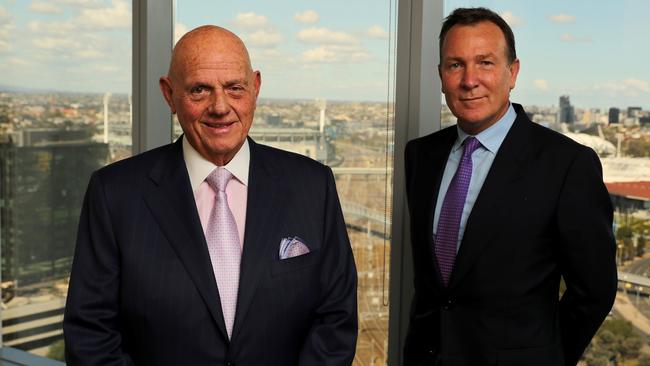Labor to face backlash on franking credits: Solomon Lew
Labor may be forced into a backdown on franking credits by a public backlash, says billionaire investor Solomon Lew.

Australia’s most successful retailer, billionaire businessman Solomon Lew, has sounded the alert over the Labor Party’s proposed removal of refundable franking credits, labelling it an “unfair” policy that will touch every member of the workforce as well as rattle the value of shares held in Australia’s $2.7 trillion superannuation system.
Mr Lew warned Federal Labor faces a voter backlash over its scheme and expects the ALP to back down on the contentious policy if elected to government next year, with the very people Bill Shorten needs to make him Prime Minister hurt the most by the shake-up of the franking credits structure.
He also took a swipe at the growing political instability emanating from the nation’s capital, saying the continued turmoil in federal politics was adding to the headwinds to an already weakened retail sector that is showing the costly strains of rising energy prices and flat wages growth.
Mr Lew, who is ranked one of Australia’s richest people with an estimated worth of $2.55 billion, is the latest business leader to decry Mr Shorten’s franking credits policy unveiled this year that originally aimed to claw back nearly $60 billion over 10 years by abolishing cash refunds for excess dividend imputation credits. The ALP later amended the policy to exempt full and part-time pensioners. The alterations also exempt pensioner recipients from self-managed superannuation funds.
While many corporate executives and fund managers have warned that the elimination of franking credits would rob retirees of a sizeable chunk of their retirement earnings, Mr Lew has linked the policy to having a knock-on impact to also the value of those shares held by all investors in Australian equities.
“They (investors) will be immensely hurt, it’s a huge problem for them because if they receive dividends in the future and have to pay tax on them it’ll also have an absolute price effect on the value of their shares,’’ Mr Lew told The Australian.
“So it’s just not the franking credits, it’s what going to be the return on the valuation of the shares. All superannuation funds hold shares and they are all members of the workforce, so I think the Labor Party will have to reconsider if they want to get support,’’ Mr Lew said.
“It’s not just support of business, it support of the rank and file in Australia - nobody likes it, nobody wants it.’’
Mr Lew, who is the former chairman of Coles Myer and has built up a billion dollar empire around fashion and retail chains such as Just Jeans, Portmans, Peter Alexander and Smiggle, argued after the shareholders meeting of is Premier Investments company that rich and poor alike would be harmed by the ALP proposal.
“It is going to have an effect on all investors, large and small, I think it’s going to have a bigger effect on the smaller shareholders that are investors across the board on the stock exchange,’’ Mr Lew said.
“It is very unfair, people have bought these shares in companies for the long term, they are in their super funds and obviously we are watching the political landscape to see where this is heading.”
Mr Lew said the ALP should prepare for a backlash from voters if they try to enact the policy in government.
“They (the ALP) are depending, are dependent, on all of Australia voting to get into power, so amongst those voters are plenty of investors in the sharemarket and … retirees who are basically living off their franking credit income.
“I think there will be a big backlash and you may see the Labor Party back down on this particular item.’’
Deputy chair of a Parliamentary standing committee looking into the franking policy and ALP parliamentary party member Matt Thistlethwaite told The Australian recently the franking policy was fair, would help repair the federal budget and ultimately be of benefit to retirees as the money saved from the initiative paid for healthcare and aged care.
But that standing committee was also told by fund managers, such as the bosses of billion dollar listed investment companies Argo Investments and Australian Foundation Investment Company, that retirees and those approaching retirement were telling them they were distressed over the proposed ALP policy and were worried about how they would cover their bills if the refunds were removed.
Last month Labor Treasury spokesman Chris Bowen told The Australian that franking credit refunds cost the budget $6 billion a year and is projected to increase to $8 billion over the next decade.
“The nation can no longer afford this extravagance — and no other country has a fully refundable dividend imputation system.”
Veteran fund manager Geoff Wilson has also savaged the Labor Party’s policy to eliminate cash payments for excess franking credits, describing the policy as “appalling” for retirees and the nation’s capital market.
“It’s going to devastate the lives of ordinary Australians. I think what they’re proposing is appalling.”
Mr Lew also called on Canberra to fix its problems, saying political upheaval and uncertainty was not helping the fragile retail sector and business or consumer confidence. This was made worse by the rising cost of living and flat wages growth.
“The retail sector has not been helped by the continued turbulence in the Australian political landscape.
“This has created sustained and unwelcome uncertainty for the economy and the retail sector which has also faced pressure as households feel the effects of higher costs of living, coupled with a period of sustained wage stagnation,’’ Mr Lew said.




To join the conversation, please log in. Don't have an account? Register
Join the conversation, you are commenting as Logout